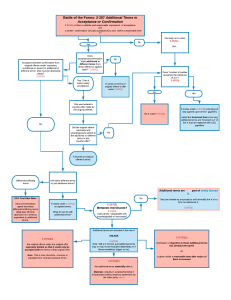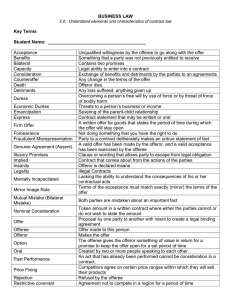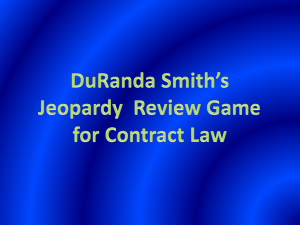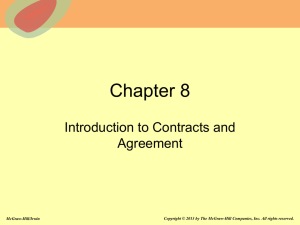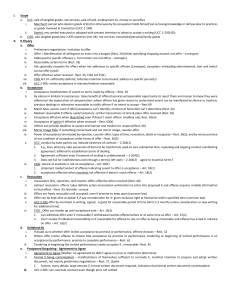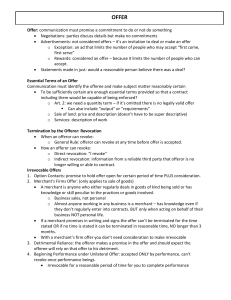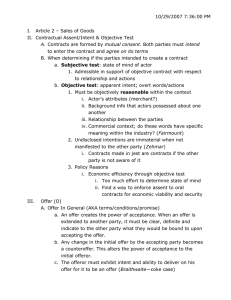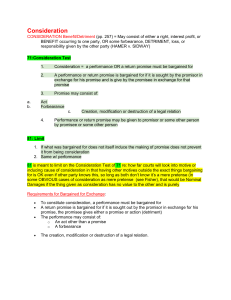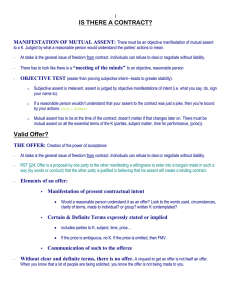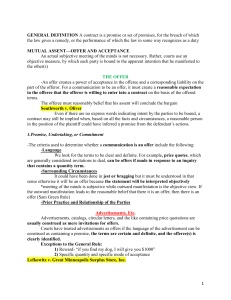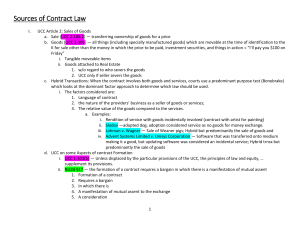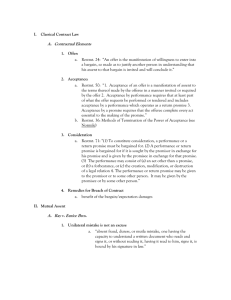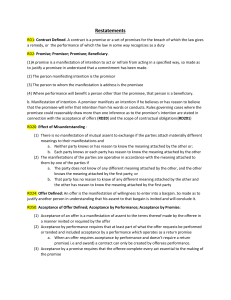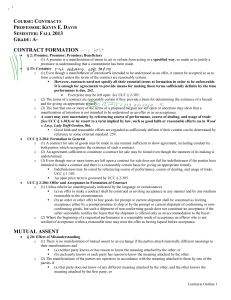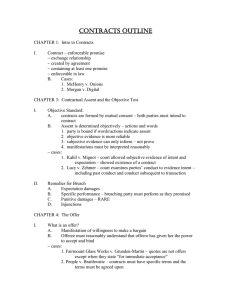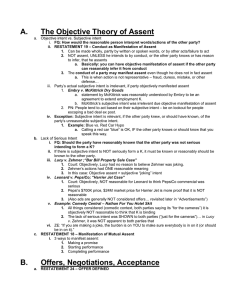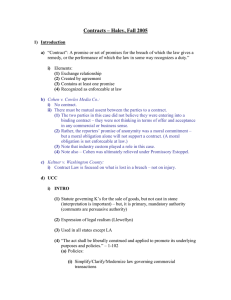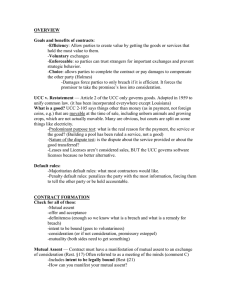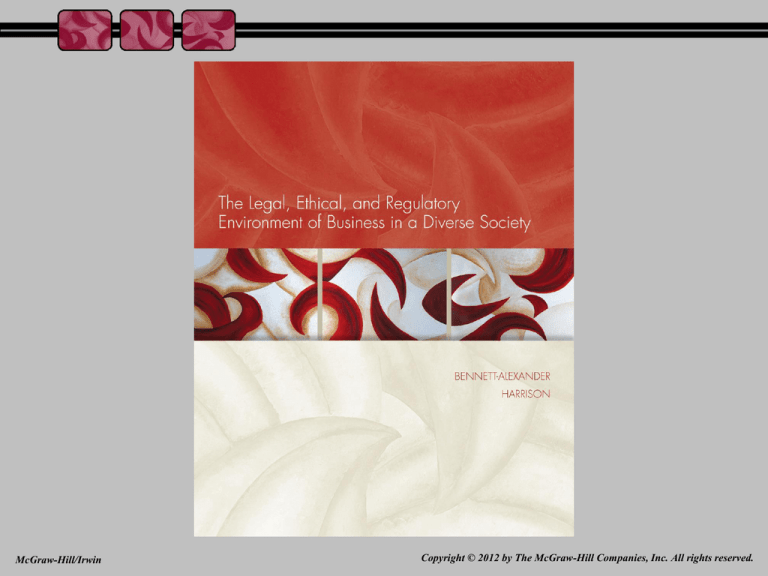
McGraw-Hill/Irwin
Copyright © 2012 by The McGraw-Hill Companies, Inc. All rights reserved.
5-2
Learning Objectives
Give the two sources of contract law
Define a contract and what it is designed to do
Understand the difference between the various classifications of
contracts
Recite the remedies available for breach of contract
Provide the requirements for a valid contract
Define mutual ascent and know what comprises it
Give at least five bases for termination of offers
Distinguish between acceptance under the UCC and the
Restatement
Determine what is and is not sufficient consideration to support a
contract
5-3
Learning Objectives cont’d
Discuss the various ways that parties can lack capacity to contract
List several ways for contracts lacking legality and the impact of
such
Distinguish between the Statute of Frauds and the Parol Evidence
Rule
Understand the difference between assignment and delegation of
contracts
Determine whether one not a party to a contract can still benefit
there from
Tell how conditions impact contract performance
5-4
Contracts - Definition
A contract is a voluntary agreement
between two or more parties for
which the law will provide remedies
for nonperformance (breach).
5-5
Parties to a Contract
Every contract involves at least two
parties.
Offeror – the party who makes an offer to
enter into a contract.
Offeree – the party to whom an offer to
enter into a contract is made.
5-6
Remedies
If one party fails to perform as promised, the other party
can use the court system to enforce the contract and
recover damages or other property.
Remedies put the non-breaching party in the position he
or she would have been in had there been no breach.
Legal Damages
o Money damages
o Punitive damages
Equitable Damages
5-7
Sources of Contract Law
Two sources of Contract Law:
Restatement of Contracts (Common Law)
Compilation of the most common approaches to states’
common law of contracts, but is not, in and of itself, law.
Uniform Commercial Code (UCC)
Addresses contracts for the sale of goods, defined as
tangible, movable, personal property.
Article 2 of the UCC deals with buying and selling goods.
5-8
Classification of Contracts
Valid, Void, Voidable, Unenforceable
Executory: Not all obligations performed
Executed: All obligations performed
Unilateral: A promise for an act
Bilateral: A promise for a promise
Express: All terms actually agreed – oral or written
Implied in Fact: Created by parties’ conduct
Implied in Law: Quasi Contract
5-9
Valid Contract Requirements
(1) Legal subject matter
(2) Capacity of the parties to enter into contracts
(3) Exchange of consideration or something of
agreed value between parties
(4) Mutual assent between the parties
5-10
Termination of Offer
Death of Either Party
Destruction of the Subject Matter
Revocation by the Offeror
Rejection by the Offeree
Incapacity of either party
Illegality of the subject matter
Lapse of stated or reasonable time
5-11
Effective Dates of Actions
Offer – When received by
offeree
Acceptance— Effective
when sent if properly done
•If not properly done, effective
when received by offeree
Acceptance after a prior
rejection—first response to
reach offeror is effective
Rejection—Effective when
received by offeror
Revocation—Effective when
received by the offeree
5-12
Acceptance
Intent to accept
Communication to offeror
“Mirror Image Rule” (Common Law):
Offer must be unequivocal and a mirror image of the offer. If it is
not, and any terms are changed by the offeree, it is considered to
be a counteroffer which terminates the original offer.
Note: UCC Art. 2: any means of acceptance reasonable under the
circumstances is effective as an acceptance and creates a contract
5-13
Acceptance
Types of Acceptance
Direct
Occurs when the offeree communicates to the offeror his
wish to enter into the contract.
Indirect
Occurs when the offeror does some act consistent with
acceptance, such as sending a check for the amount of the
offer within the time specified.
When is Acceptance effective?
Mailbox Rule
5-14
Acceptance
Genuineness of Assent
– Voluntary and legitimate
Challenges to Mutual Assent:
Duress
Undue Influence
Mutual Mistake
Unconscionability
Fraud in the Inducement
Fraud in the Execution
5-15
Consideration
A bargained for legal detriment exchanged
between the parties.
Anything of value exchanged between the
parties to a contract
Adequacy
Legal Detriment
Legal Benefit
5-16
Consideration
Inadequate Consideration
Gratuitous Promises
Promissory Estoppel
Past Consideration
Pre-existing legal or contractual obligation
Moral obligation
Illusory promise
5-17
Capacity
Ability of parties to understand the
consequences of entering into an
agreement at the time the contract is
formed
Minors
Mentally incompetent persons
Intoxicated persons
5-18
Legality
If subject matter of contract is illegal, the
contract is void.
Usury
Gambling
Unlicensed professionals
Violation of public policy
5-19
Enforceable Contracts
Statute of Frauds
Certain contracts must be in writing to be enforceable in
court:
Marriage (contracts made in consideration of marriage)
Y ear
(Contracts incapable of being performed within a year from the
time they are made)
Land
(Contracts for an interest in land)
Executor (Executor’s promise to be personally liable for decedent’s debts)
Goods
(Contracts for goods of $500 or more)
Surety
(Contract of a surety to be bound for the debts of debtor if
debtor does not pay)
5-20
Enforceable Contracts
Parol Evidence Rule
– If there is a valid, written, integrated contract
between the parties, then evidence of prior or
contemporaneous agreements will not be
permitted to vary or alter its terms.
5-21
Contracts Involving Third-Parties
Assignment
The transfer of rights under a contract by the
obligee to a third party
Delegation
A transfer of contractual duties by the obligor to a
third party for performance.
“Assignment of all rights”
Assignment of all rights under a contract, and
Delegation of all duties under a contract
5-22
Third-Party Beneficiaries
Third parties can sometimes claim rights
under others’ contracts.
Such third parties are either:
Intended third-party beneficiaries
Donee beneficiaries or
Creditor beneficiaries
OR
Incidental third-party beneficiaries
5-23
Conditions to Contract Performance
Conditions Precedent
An event that must occur before a party is
obligated to perform under a contract.
Conditions Subsequent
Performance is not due until and unless a
condition is met.
Concurrent Conditions
Parties to a contract must perform at the same
time.
5-24


